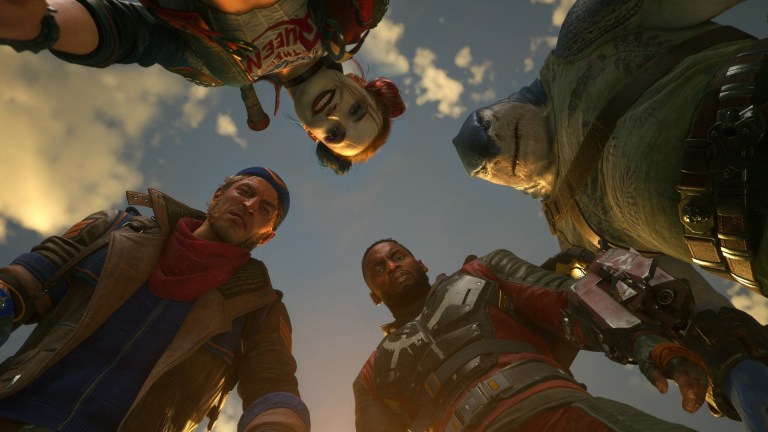James Gunn’s Plan for DC Video Games Sounds Awfully Convoluted
James Gunn hinted at an ambitious future for DC video games, but he might be hoping for a little too much.

Late last year, Guardians of the Galaxy director and Howard the Duck enthusiast James Gunn joined DC Studios as the co-chair of film, TV, and animation. Recently, he laid out a roadmap for upcoming projects and also revealed his plans also extend into video games. On the one hand, his dreams are certainly ambitious. On the other hand, they might be too ambitious to the point of becoming self-defeating.
During a recent press event, Gunn and fellow DC Studios co-head Peter Safran discussed their plans for future DC Universe content. According to SlashFilm, the discussion turned to video games. While Safran said gaming will be a “big part” of their future plans, Gunn offered a few more specifics about DC’s gaming ambitions.
“What’s very different about it, for us, for DC, it’s not like we’re going to have Superman come out, and then have the Superman game come out,” Gunn says. “It’s more like, we have Superman come out then, two years later, we have Supergirl coming out. So, what’s the story in between there? Is there a Krypto game that we can play, that comes in between, that’s still set in the world with these characters? But that is its own thing. To sort of give games the prominence that they deserve.”
In Gunn’s own words, they want every project to be connected in terms of casting and continuity. For instance, as SlashFilm pointed out, one of his upcoming shows will star Viola Davis as Amanda Waller. Under Gunn’s unified multimedia banner, Davis will reprise that role for any future show, movie, or video game that features Waller, and the events of one story will impact the others.
At first glance, Gunn’s proposition isn’t too out there. After all, when Kevin Conroy (RIP) became the emblematic voice of Batman thanks to Batman: The Animated Series, voice directors usually turned to him if they needed someone to voice the Caped Crusader. Conroy reprised the role in Batman Beyond, numerous animated DC movies, and both Injustice video games, just to name a few projects. He even played a live-action Bruce Wayne in Crisis on Infinite Earths.
But, do you know what those stories share in common (the DC universe and Conroy notwithstanding)? Pretty much nothing. They are all separate, standalone facets of a larger DC multiverse meant to be enjoyed without prior knowledge of other DC stories. Half the fun of Injustice is its very nature as a “What if?” story. What used to be the Justice League has splintered between the fascist Regime and underground Insurgency, and fans can enjoy a super-powered civil war without worrying it will impact the rest of the DC canon. Moreover, the Injustice games got to pull off some wild and wacky situations, such as adding in guest characters like Hellboy and Sub-Zero, largely because they weren’t limited by existing DC continuity.
Comparatively, Marvel has come to understand the importance of keeping its video game canons separate (most of the time, anyway). Marvel’s Spider-Man is an excellent example of the benefit of that separation. Marvel gave developer Insomniac carte blanche to do what they wanted with that game’s story and characters. Heck, Marvel explicitly told the studio’s staff members to make their own story, which resulted in a gripping and human narrative that belonged to that game.
Other recent Marvel games, such as Marvel’s Avengers and Guardians of the Galaxy, also aren’t weighed down by existing continuity, much to their benefit. Sure, both games feature character designs that resemble their MCU counterparts if you squint hard enough, but their voices and personalities go off in unique directions, and they participate in standalone stories. Marvel’s Guardians of the Galaxy, for example, tells a fantastic story about coming to grips with the loss of a loved one and how not dealing with those emotions can lead people down dark paths. That story wouldn’t work if its main cast belonged to the MCU Guardians of the Galaxy franchise.
Not only does Gunn’s plan potentially restrict the stories future DC games can tell, but it also presents several logistical nightmares. Producing modern video games and modern movies are two wildly different challenges. Movies are often more expensive to produce, but major video games often take much longer to produce and are typically subject to any number of technical or logistical problems that could delay that production further. Bloomberg reporter Jason Schreier recently stated that “video game production cycles have gotten so long that if a big-budget game studio started working on a brand new project today, it would likely be for the PlayStation 6.” It’s unlikely those production cycles are going to get shorter anytime soon.
The longer a game takes to produce, the less likely it is that it will be released in time to tie into a connected movie or show. That can easily cause continuity headaches or simply upset the seemingly simple plan of a “bridge” game. What if a game supposedly takes place between two films and chronicles events crucial to understanding character motivations? What if audiences don’t want to drop $70 on a game so closely related to a movie (or two) they may or may not have liked in the first place?
Now, Gunn did mention that a hypothetical Krypto game that fits that schedule format would still be “its own thing,” which is certainly comforting. Even still, some of the most successful superhero/comic book games in recent years show that it’s generally a better idea to keep games as separated as possible. That way, they’re free of associated expectations, creative handcuffs, scheduling woes, and the kind of tie-in production problems that led to games like The Dark Knight getting canceled. Obviously, a version of Gunn’s plan could still work. It could also be a repeat of the Kingdom Hearts conundrum where “spin-offs” developed for Nintendo handhelds held bits of lore and plot crucial to the main entries on Sony consoles.
As impressive as multimedia franchises where all the characters and stories are connected may sound, they’re often more trouble than they’re worth. All the potential DC games we could miss out on due to developers being shackled to existing continuity (to whatever degree) combined with the organizational labyrinth that comes with making those plans work doesn’t inspire much hope. It’s not that I think James Gunn and the DC team aren’t talented enough to make it work but rather that I think they’re biting off more than even King Shark could chew.
